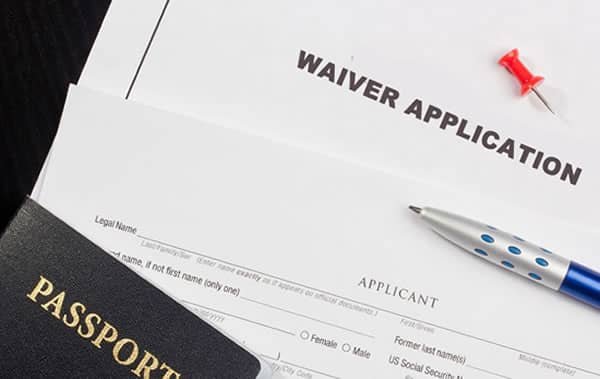
Provisional Waivers - FAQs
Frequently Asked Questions
A waiver is a pardon for a ground of inadmissibility. Before an applicant for a visa can be admitted for any visa type, the applicant must establish that they are admissible or that they have received a waiver for the ground of inadmissibility that applies to them. There are several different kinds of waivers. For example, there are waivers for misrepresentation or fraud, waivers for certain crimes, and waivers for unlawful presence.
The provisional waiver only applies to individuals seeking a waiver for unlawful presence who have a visa available and a qualifying relative to whom extreme hardship may be demonstrated. It is applied for and adjudicated before the visa appointment at the US consulate abroad.
Only a US citizen (USC) or lawful permanent resident (LPR) spouse or parent is a qualifying relative for this type of waiver.
You must prove that your qualifying relative(s) would experience “extreme hardship” as a result of your separation from your qualifying relative(s) who remain(s) in the USA without you or by your qualifying relative(s) relocation to your home country to join you there. We hope that USCIS will create a bright line test in the future, but for now there is no specific definition or exact criteria but more of a weighing of the facts and exercise of discretion. The applicant has the burden to prove their case. Everything claimed as an extreme hardship should be backed up with documentary evidence.
The advantage of the provisional waiver is knowing your waiver is approved before you depart the U.S. Prior to the provisional waiver program, you would have to leave the U.S. for your immigrant visa interview and only upon the inadmissibility determination could you file your waiver application. Then you would have to wait outside the U.S. for a decision.
Because it is not the final determination. If the U.S. consular officer determines that you have an additional ground of inadmissibility, you would not be issued a visa until another regularly filed waiver is approved which covers that additional ground of inadmissibility.
Unlawful presence is the time you accrue after your I-94 card expires or in the case of those who enter “EWI” without inspection for the entire time you are in the U.S. unlawfully. Exception: if you were admitted as a student or exchange visitor (F-1 or J-1) and your I-94 card indicates D/S (short for duration of status) you may not accrue unlawful presence even though you may be out of status.
The expansion of the provisional waiver program does a few things:
It expands qualifying relatives to include permanent resident (LPR) spouses and parents as well as US citizen spouses and parents (so no longer just USC spouses and parents);
It allows any number of different kinds of immigrant petitions to form the basis of the visa availability, such as an I-140 employer petition.
It allows SOME individuals with final orders of removal to apply after approval of an I-212 permission to re-apply for admission after deportation.
It does away with a reason to believe standard for denial. Previously, provisional waivers were being denied if the adjudicator believed that the applicant had another ground of inadmissibility which disqualified the applicant from the provisional waiver. The “reason to believe” standard was problematic because some determinations were overly broad and the applicant should not have been disqualified. Now the applicant must really be certain there is no additional ground of inadmissibility because the immigration adjudicator will not be looking for it. This is a major CAVEAT!
Contact our Board Certified Immigration Attorneys in Orlando for Questions About the Provisional Waiver Program
If you are considering applying for a provisional waiver or have questions about the program contact Vazquez and Pudat today! Florida immigration attorneys Suzanne Vazquez and Maud Poudat are certified as experts in Immigration and Nationality Law by the Florida Bar. Call us at (407) 674-6968 during office hours or fill out the online form provided on this page and we will call you back as soon as possible. If you have an emergency after office hours please call or text us at (407) 925-2554 and we will contact you shortly.